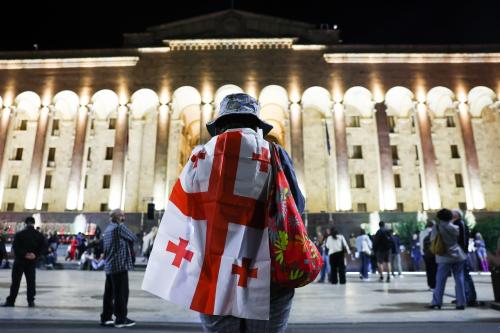Justice Kennedy is not a liberal’s favorite judge. He cast a crucial vote to enable the Bush presidency, and he has consistently supported removing restraints on money in politics. But when gay rights are the issue, the left, and those on the right who favor equality for gays, have no greater judicial hero. Over the past two decades Kennedy has authored four landmark decisions advancing gay rights: Romer v. Evans, Lawrence v. Texas, United States v. Windsor and on Friday June 26, Obergefell v. Hodges. In the two most recent cases his was the crucial fifth vote, invalidating portions of the Defense of Marriage Act in Windsor, and in Obergefell striking down state rules barring same sex marriage. His opinions on gay rights are so very different in tone and reach from his opinions when questions implicating equality for blacks are at issue that one cannot help but wonder whether a future historian of the Court will discover some close personal connection that predisposes Kennedy to overturn rules that disadvantage gays.
The dissenters kept precedent in the closet
Something similar may be said of the dissenters. The judicial may well be the personal. Only Justices Scalia and Thomas were on the Court when Romer and Lawrence were decided, but neither they nor the other dissenters, Chief Justice Roberts and Justice Alito, have ever voted to protect the rights of gay people. It is easy to conclude that objections to the “gay lifestyle” motivate at least some of their dissents. This may well be true even if none of the Obergefell dissents hints at such thoughts. Scalia, for example, makes a point of saying that whether gays should be allowed to marry “is not of immense personal importance to me,” but consider his statements in Romer and Lawrence and what they imply about his attitudes. Romer had nothing to do with gay sexual relations. It asked whether Colorado’s voters could by referendum prohibit the state and its political subdivisions from outlawing sexual orientation discrimination. At the time Romer arose the gay rights movement was still nascent, and only ten years had passed since Bowers v. Hardwick had held that states could, consistent with the Constitution, criminalize private gay sexual behavior. Perhaps since 1996 Justice Scalia has come to feel differently about the morality of gay sex, but in Romer, with the concurrence of Justice Thomas, Scalia called the holding in Bowers “unassailable” and wrote:
“First as to [the amendment’s] eminent reasonableness. The Court’s opinion contains grim, disapproving hints that Coloradans have been guilty of “animus”… toward homosexuality…. I had thought that one could consider certain conduct reprehensible – murder, for example, or polygamy, or cruelty toward animals – and could establish even ”animus” toward such conduct. Surely that is the only sort of “animus” at issue here, the same sort of moral disapproval that produced the centuries-old criminal laws that we held constitutional in Bowers. …. Coloradans are…entitled (emphasis in original) to be hostile toward homosexual conduct….”
An implication of these considerations was:
”The constitutional amendment [prohibiting legislation barring sexual orientation discrimination] before us … is… a modest attempt by seemingly tolerant Coloradans to preserve traditional sexual mores against the efforts of a politically powerful minority to revise those mores through the use of law.” In holding that homosexuality cannot be signaled out for disfavorable treatment, the Court…places the prestige of this institution behind the proposition that opposition to homosexuality is as reprehensible as racial or religious bias.”
Later in Lawrence, which overturned Bowers and held unconstitutional the criminalization of private gay sexual activity, Scalia suggested that homosexual behavior was akin to other activities, some of which people would find abhorrent. He argued that if gay sex could not be criminalized, laws prohibiting “bigamy, same-sex marriage, adult incest, prostitution, masturbation, adultery, fornication, bestiality, and obscenity” must also be struck down. Although concurring with Scalia, Thomas in this case distanced himself from the implication that he thought gay sex immoral. In a separate two paragraph dissent, he called the Texas law criminalizing homosexual behavior “uncommonly silly,” and said that if he were a member of the Texas legislature, he would vote to repeal it.
The four dissents in Obergefell do little to allay suspicions that for some Justices attitudes toward homosexuality are hidden motivators of their opinions. Suspicions are supported not by what they say but by what they don’t say. Except for the occasional extraction of a helpful sentence or two, the dissents studiously ignore recent, relevant precedent. It is as if the dissenters find Romer, Lawrence and Windsor so fundamentally mistaken as to be unworthy of mention. The result is opinions far removed from standards of judicial craftsmanship which, even at the Supreme Court, presume that precedent establishes the framework from which analysis begins and typically leads judges to carefully distinguish unwelcome precedential cases from the case they must decide. Distinctions between the past cases and Obergefell could be easily made, but this would require, even if only for the purpose of argument, acknowledging the ongoing legitimacy of prior precedent. No dissenter could bring himself to do this.
A yet more serious failure of legal analysis is the dissenters’ failure to treat one of the issues the Court highlighted when it decided to review Obergefell. This is whether states can refuse to recognize same sex marriages that are valid where they were celebrated. This is not a side issue. It is the only issue raised by Obergefell and most of his fellow plaintiffs. The justices in the majority addressed the issue, but it wasn’t difficult for them. In deciding that states must allow same sex marriages, they necessarily decided the recognition question. The dissenters are, however, differently situated. Even if states need not allow same sex couples to marry, which is the dissenters’ position, it does not follow that they can refuse to acknowledge the legitimacy of marriages validly celebrated elsewhere. The issue poses special problems for the dissenters. The argument at the core of most dissents is that the Court’s majority has unwisely and inappropriately taken upon itself to decide a question that is for the people to resolve through normal democratic processes. Justice Scalia was perhaps the bluntest in making this point. He opened his dissent by saying that he wrote separately “to call attention to the Court’s threat to American democracy.” The same theme was sounded in each of the other dissents, sometimes in language almost as strident as Scalia’s.
These paeans to democracy might be more convincing if they were they not coming from justices who had voted to gut the Voting Rights Act, to allow unlimited corporate political donations, and to permit voter ID laws likely to depress minority voting while curing no proven problem. They might also have been more convincing had the dissenters addressed the marriage recognition issue. A number of the Obergefell couples had been married in states where the voters or their representatives had chosen to legalize same sex marriage. They encountered difficulties only when they moved to states that, citing their own same sex marriage bans, refused to recognize the couple’s legal marriages, or in one case refused to treat a couple as married even though they remained residents of a state that recognized their marriage. One is hard pressed to find in theories of democracy, a justification for allowing Ohio’s voters to undo what New York’s voters, for example, had agreed to. Determined dissenters could have upheld non-recognition through convoluted and questionable arguments, including perhaps the characterization of homosexual behavior as immoral, but they could not have accused the majority of inappropriately substituting its judgment for the will of the voters. It is for courts and not for the voters to say when one state must accept or defer to the laws and judgments of another.
The dissenters’ failure to even mention the recognition issue is bizarre. They should either have labeled their opinions “dissenting in part” and agreed with the majority’s holding on the recognition issue, or they should have indicated and justified their disagreement with both issues the case posed. But addressing the recognition issue would, on the one hand, have meant agreeing to require states to recognize some same sex marriages, or, on the other hand, acknowledging that they were choosing between the rules of two state electorates with little more to justify their choice than their personal preferences. I expect the dissenters found the first option unacceptable because they wanted no part in the legalization of same sex marriage, while the second option would have meant that the democratic high road they claimed to be defending was no longer available. They could escape the dilemma only by ignoring their obligation to speak to an issue they had agreed to review. This is the path they followed. It allowed them to wage war with the majority’s opinion on their own terms.
Kennedy the poet, not the jurist
As a work of judicial craftsmanship, Kennedy’s opinion for the Obergefell majority has its own shortcomings. Much of it runs riffs on the nature of marriage that are barely relevant to the core legal issues. But from a purely legal standpoint, it is not as problematic as the dissents. In large part due to his own prior opinions, Kennedy has the advantage of having precedent on his side. Not only did Romer, Lawrence and Windsor increasingly expand the constitutional protections accorded gays, but other cases establish a 14th Amendment liberty interest in the right to marry. The latter include decisions overturning bans on interracial marriage, marriage while behind on child support, and marriage while incarcerated. The link that binds Kennedy’s prior decisions and which emerges again in Obergefell is the right of homosexuals to be free from dignitary harms. Not only is it hard to find an anchor for this right in the Constitution, but the dignitary interests of gays have become less threatened as gay groups have become open, effective political actors, and circles where gayness is not an issue have expanded dramatically, even in states that bar same sex marriage. Most telling, the plaintiffs in Obergefell are not complaining of insults implicit in marriage bans. They seek not greater dignity but the benefits of marriage: financial benefits, the ability to adopt children as a couple, recognition as next of kin when a partner is hospitalized and the opportunity to express their love in a legally binding commitment.
Perhaps the greatest failure of Kennedy’s opinion is its refusal to recognize same sex marriage bans as either a form of gender-based discrimination, albeit based on pair relationships, or to recognize that homosexual orientation is the largely immutable characteristic of a long discriminated against group. Either approach would justify subjecting laws that disfavored homosexuals to a heightened scrutiny that not just same sex marriage bans, but other gay-unfriendly laws, would be unlikely to survive. Moreover, holding that homosexuality was like gender—a suspect category—would provide the lower courts with a familiar standard for evaluating legal challenges to questioned laws and practices. Kennedy’s refusal to extend heightened scrutiny to the same sex marriage laws at issue in Obergefell, is consistent with his prior opinions. In each of his gay rights opinions, Kennedy could, with the likely concurrence of the other justices in the majority, have held that laws disadvantaging gays were subject to heightened scrutiny. Had he done so, the opinions in Obergefell might have been different. It would, in particular, have been harder for the dissenters to ignore, as they do in their opinions, the implications of the long history of anti-gay discrimination for the propriety of Supreme Court intervention. Instead, the dissenters see in the softening of that discrimination less reason for a court to speed the movement for equality. By purporting to apply rational basis scrutiny, Kennedy is giving gays the compliment of asserting that laws that disadvantage them are completely unreasonable, but he is also opening himself up to the charge that his views are moored more in his personal perspective than in the Constitution.
If Kennedy’s opinion is less than satisfactory in its judicial craftsmanship, it is in part because Kennedy wanted to do more than pronounce a legal outcome justifiable by precedent and the history of anti-gay discrimination. Rather than focus narrowly on legal issues, Kennedy has written a moving and elegant essay on the joys and virtues of marriage, the pain that gay couples and their children face when they cannot marry, and the benefits that accrue to both gay couples and society when same sex couples can marry. Already the words with which he concludes his opinion are being widely shared:
“No union is more profound than marriage, for it embodies the highest ideals of love, fidelity, devotion, sacrifice, and family. In forming a marital union, two people become something greater than once they were. As some of the petitioners in these cases demonstrate, marriage embodies a love that may endure even past death. It would misunderstand these men and women to say they disrespect the idea of marriage. Their plea is that they do respect it, respect it so deeply that they seek to find its fulfillment for themselves. Their hope is not to be condemned to live in loneliness, excluded from one of civilization’s oldest institutions. They ask for equal dignity in the eyes of the law. The Constitution grants them that right.”
Kennedy’s opinion is written not for lawyers and judges but for the entire nation. His prose reads as if he thinks his eloquence can persuade those who would vote to bar same sex marriage to see the harms they are causing to people who in their hopes and ambitions, their claims to respect and their loving partnerships are just like themselves. Having to contend with such an opinion may explain why the dissenters too write as if the legal moorings within which judges are supposed to navigate matter little. What we have in the dueling opinions is a cultural conflict fueled, I expect, by attitudes toward homosexuals as mediated for some by religious values, and barely dressed up in legal language. The culture that welcomes gays as equals has in Obergefell prevailed.
The Brookings Institution is committed to quality, independence, and impact.
We are supported by a diverse array of funders. In line with our values and policies, each Brookings publication represents the sole views of its author(s).




Commentary
Obergefell v. Hodges: Same sex marriage & cultural jousting at the Supreme Court
June 29, 2015